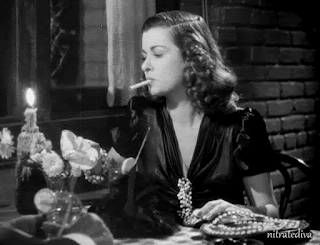This was a twisty one. Directly by the great Fritz Lang, of M and Metropolis fame, this was reputed to be his favorite of his American films. It does have a smack of the melodrama of the silents, particularly the ending, but it's usually classified as a film noir. But then again, film noirs are pretty melodramatic and have very rigid notions of destiny and justice. The big star is of course Edward G. Robinson (who was Romanian, and actually really looks it here, what with the glossy widow's peak, but is playing the very Anglo-named Chris Cross) but he's playing against type as a milquetoast brow-beaten cashier, whom we see getting a commemorative watch for his decades of service in the firm at a party at the beginning. His boss can't stay long, however, because his sexy young mistress is waiting in the car, a foreshadowing of Chris's fate. Chris, it transpires, is a frustrated painter. Well, not really frustrated, because he still devotes every Sunday to it, but he never wanted to be a cashier, and in fact he was more-or-less forced to marry his harridan of a landlady five years prior to help pay for his paints. And "Adele" really is a gorgon, always nagging him, complaining about the smell of paints and how he can't hold a candle to her former husband, Detective Homer Higgins, whose giant portrait (complete with posthumously-awarded medal) looms over the sitting room. Homer drowned while trying to save suicidal woman, although neither body was ever found. All of these things are no doubt on Chris's mind as he wanders around after the party trying to find a subway stop, and in fact wanders into Greenwich Village, where he happens upon a man striking a (very attractive, young) woman (played by Joan Bennett). Uncharacteristically (he is a bit drunk after the party), Chris rushes in to help her with his brolly and somehow the man winds up unconscious on the ground. Chris rushes off to get the police, but when they return, the man has vanished. He walks the woman, who is called Katharine but goes by Kitty, back to the apartment she shares with a roommate (Millie), but before she goes he persuades her to have a coffee with him.
Well, on her insistence, it becomes rums for both of them, but he overhears her ask the bartender where "Johnny" is. She claims he's Millie's beau. Meanwhile he guesses her job as "actor" and she gets the impression that he is not an amateur weekend painter but in fact a famous, rich painter. Of course Johnny is really her no-good boyfriend, whom Millie (who is real) can't believe she sticks with when she could have anyone she wants ("But I only want him!") who quickly persuades her to milk poor besotted Chris for all that she can. Very soon he's embezzling money from his firm to help set her up in a studio apartment. He does get something out of it, though - he gets a nice place to paint, and doesn't have to worry about the awful Adele following through on her threat to throw out his paintings and paint. Then a twist you weren't expecting: Johnny gets desperate for cash and tries to pawn a couple of Chris's (unsigned) paintings. The pawn shop owner sees his own shopfront in one and assumes they've been painted by "some Greenwich Village long-hair" and declares them worthless. So Johnny leaves them with a street vendor to see if he can offload them and returns to inform Kitty that Chris has been fooling her. He then decides to prove it to her by taking the pictures to the museum of art, but returns to find that a famous critic has bought them and wants to know who painted them. The critic eventually tracks them to Kitty's apartment, whereupon Johnny hits on the idea of claiming that Kitty painted them. She quickly becomes the talk of the town, before Adele comes across the pictures in a gallery... and comes home to scold Chris for copying the work of "great artist" Katharine March. What will Chris do? Will he find out about Johnny? Will he ever get credit for his work? Will he get caught for his embezzling? With the loathsome (he really is, credit to Dan Duryea for an effectively hateable performance) Johnnie get his? Watch it and find out. Extra twists: the return of Homer! Murder by icepick! A failed suicide! Ghostly voices haunting a guilty man! It certainly has more twists and turns than two average films.
Saturday, December 7, 2019
Subscribe to:
Post Comments (Atom)



No comments:
Post a Comment